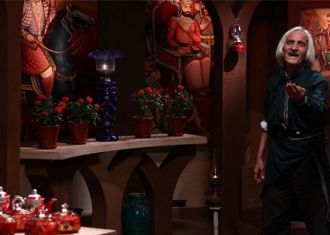ID :
295049
Mon, 08/05/2013 - 11:13
Auther :
Shortlink :
https://oananews.org//node/295049
The shortlink copeid
Morshed Torabi dies at 77

TEHRAN,Aug.5(MNA) -- Valiollah Torabi Sefidabi, known as Morshed Torabi, one of the few masters of naqqali, a traditional form of dramatic storytelling in Iran, has died of liver cancer at Tehran’s Madaen Hospital on Saturday afternoon. He was 77 years old.
Torabi was born in the village of Sefidab near the town of Tafresh in Central Province in 1936. His family moved to Tehran when he was a child. He learned to read and write at a maktab, a kind of traditional Iranian school which was usually managed by Muslim clerics.
His father was a performer of tazieh, an Iranian passion play, so he began his career in this field during childhood. However, he left this career path at 20 and started to learn traditional martial arts, including fencing, chub-bazi, lance throwing and wrestling.
He got permission from his father also to learn naqqali from Morshed Ruhollah Shoqi at that time. He acquired all the subtleties of the art over five years and began a career in naqqali at a large teahouse in 1961.
He had his own style in performing the movements and the natural sound effects, which are created by the actor using the mouth in naqqali.
Morshed Torabi performed at many Iranian and international events, and he was honored at some of them.
He had collaborated with Davud Fat’halibeigi, an expert on Iranian traditional performing arts, in some TV and radio programs over past few years.
Naqqali was registered on UNESCO’s List of Intangible Cultural Heritage in Need of Urgent Safeguarding in November 2011.
It has long played an important role in society from the courts to the villages.
The performer – naqqal or morshed – recounts stories in verse or prose accompanied by gestures and movements, and sometimes, instrumental music and painted scrolls.
Naqqali requires considerable talent, a retentive memory and the ability to improvise with skill to captivate an audience.
Naqqals wear traditional Iranian costumes, but may also put on ancient helmets or armored jackets during performances to help recreate battle scenes.
Naqqali was formerly performed in coffeehouses, tents of nomads, houses, and historical venues such as ancient caravansaries.
However, a decline in the popularity of coffeehouses combined with new forms of entertainment has resulted in diminishing interest in naqqali performance.
In addition, the aging of master performers and the decreasing popularity among the younger generations have caused a steep drop in the number of skilled naqqals, threatening the survival of this dramatic art.





